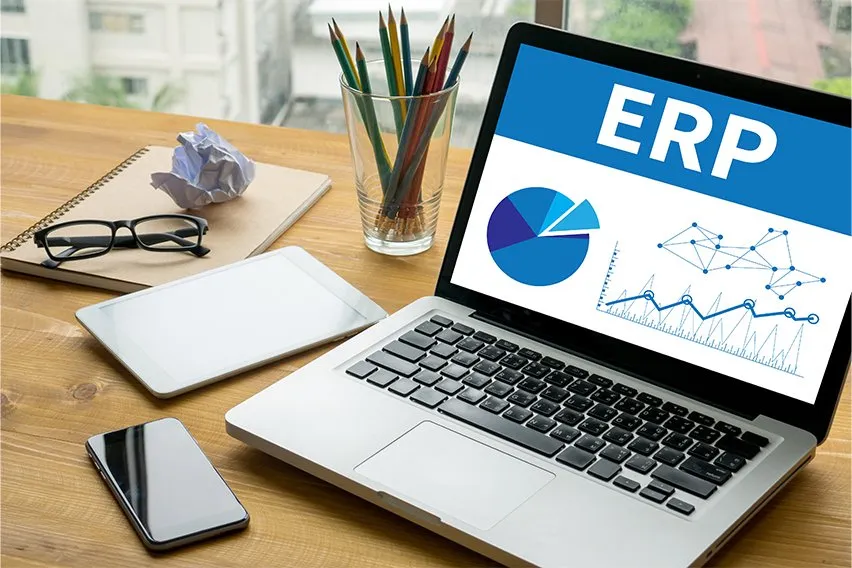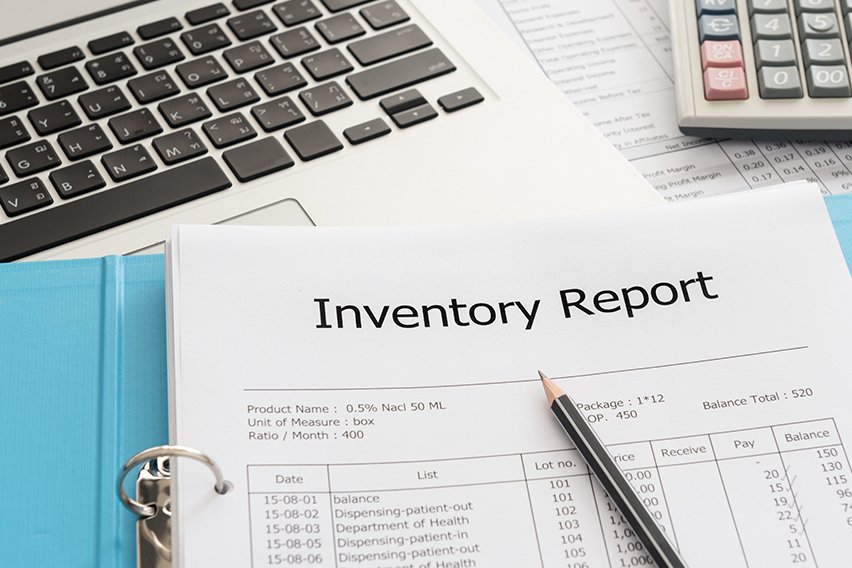ERP Implementation: A Definitive Guide

Are you looking to implement an ERP system? Implementing an ERP system is a big decision, and we want to make sure that your business gets the most out of it. Enterprise Resource Planning (or ERP) is best thought of as an umbrella term. It covers a range of business management systems. It’s designed to integrate all a company’s data and business processes under one umbrella. It’s also a very complicated thing to implement. How do you go from nothing to fully implemented ERP? This definitive guide will tell you everything you need to know.
This article will help you through every step of the process so that you can focus on running your business. We’ll talk about ERP implementation plans, the best ERP implementations and much more.
Here’s What We’ll Cover:
What Is an ERP Implementation?
How Much Does ERP Implementation Cost?
How Long Does it Take to Implement ERP?
What is the Best ERP Implementation?
Why Should You Outsource ERP Implementation?
What Happens after ERP Implementation?
What Is an ERP Implementation?
ERP stands for “Enterprise Resource Planning.” An ERP system handles all the data and processes used by your business.
An ERP implementation is the process of transitioning your company to a new ERP business management system. This means bringing together several disparate software applications into one cohesive system. This allows for better communication between departments. It also leads to increased effectiveness in how you work.

ERP Systems are Typically Implemented in Three Steps
1) Analysis & Planning
Analysis and planning is when you work with an implementation partner to plan out your project. This comes in two parts. First, you’ll analyze your current processes, equipment and technology. This involves tasks like data gathering, process mapping and the creation of a master equipment list.
Second, you’ll plan out your ERP implementation project. This involves determining how much training your staff will need. It also means choosing which modules to install first, creating a communication strategy and more.
2) System Integration
Once you’ve understood what your current processes are and planned out the steps of your ERP implementation, it’s time to get down to business. During this phase, you’ll deliver on any number of modules that were outlined in your plan. Modules might include financials (general ledger), sales and marketing or human resources.
System integration also includes data migration. This is the process of moving your existing data into the new system. This might be done through an automated import or with assistance from your implementation partner.
3) Change Management, Training & Deployment
This is the final step on your path to a new ERP system. Changing management begins by helping your staff shift their mindsets. This includes changing from dealing with different systems and technology on a daily basis to working with one unified system.
Training courses will then be conducted. These can be on site or at your implementation partner’s location. These courses are meant to familiarize your staff with the new system.
Training courses may also be conducted for end users. These are classes to teach key business stakeholders how best to communicate with employees via the ERP system.
Deployment is arguably the most important step of an implementation project. This is when your project team begins learning about the full spectrum of their new unified ERP system. It’s also when they start really implementing it into their daily workflows.
Why Implement ERP?
There are many reasons to put in place an Enterprise Resource Planning (ERP) system. The most common include:
Centralized Data Storage. ERP systems allow you to bring all of your data in one place, so you can gain better visibility into your processes.
Increased Interdepartmental Communication. The best ERP systems are designed to integrate with other key business systems. This allows for improved communication between different departments in your company.
Improved Resource Utilization. An ERP system helps you get the most out of your existing resources by streamlining operations. It also provides full visibility into how resources are being used.
Improved Workflow. The best ERP systems are built to facilitate streamlined workflows. They do this by providing pre-built templates for common business functions.
Unified Billing & Accounting. Using an ERP system is better than using several different systems. Often because it allows you to easily bill your customers and reconcile your books automatically.
How Much Does ERP Implementation Cost?
A successful implementation can cost as much, or as little, as you want it to. You can implement a basic ERP system for your business without breaking the bank. However, the more complex your needs are, the higher your costs will be.
In most cases, you’ll have to take into account training and consulting fees when considering cost. You can often get basic training materials for free. You’ll have to pay a consulting firm if you want them to walk your staff through changes.
How Long Does it Take to Implement ERP?
Every project is different. A basic implementation should only take a few months at the most. This depends largely on how complex your system needs are and what modules you’ll be implementing first.
A complex implementation can take up to a year or more in some cases. Your project’s timeline will largely depend on how many modules you’re implementing. The types of customization work that needs to be done can also affect the timeline.
What is the Best ERP Implementation?
There is no single best implementation of an ERP system. The best implementation for your company depends on many different factors. Things like industry, size, number of users and more will all affect the best path forward.
Choosing an ERP implementation partner is another important element to your implementation process. The best partner for you will have people who understand your industry. They should have a great deal of experience implementing ERP systems and a strong customer base in your area.
The best ERP implementation may not be the cheapest one out there. It should be financially feasible within an acceptable budget range. It should also be flexible enough to accommodate future growth.
Why Should You Outsource ERP Implementation?
Many companies try to implement an ERP system on their own without any assistance. This is usually a mistake. Here are 5 main reasons why you should outsource your ERP implementation.
Five Reasons to Outsource Your ERP Implementation
- Outsourcing takes the stress off of you. Since this may be your first time implementing an ERP system, it can be intimidating. You may even feel like you are in over your head.
- An outside team will have more objectivity. They are less likely to be influenced by previous experiences with other customers or existing software issues within your company.
- Outsourcing allows for increased flexibility. Your outsourced team can work directly with you to find the best implementation fit. This is often better than being locked into a standard implementation path.
- Your outsourced team will have years of combined knowledge in your industry. They’ll be able to provide suggestions for improvement that you may not have thought of on your own.
- An outside team can handle the entire process quickly and streamline it. This saves you time, so you can get back to focusing on your core business.
Choosing a Great Implementation Team
Choosing the right partner is a crucial step in your ERP implementation process. It can be difficult to tell which company will provide you with the most value. Here are just some of the qualities that you should look for in an IT partner before signing on any dotted lines.
Experience
Look for a company that has a great deal of experience implementing ERP systems. This will ensure that they have learned from their mistakes and successes so they can provide you with the best solution possible.
Customer Base
The best companies have a strong customer base. They deliver high-quality services on a consistent basis. Be sure to check out those references.
Price
ERP implementations can be expensive. There are many different components that come together to create the final price tag. Don’t make the mistake of basing your decision solely on cost. Look at all of the components and ensure that you will still be receiving a high-quality solution within your budget.
Flexibility
Many companies have strict implementation paths that are designed to meet the needs of most customers. However, every business is different. Look for a company that will adjust their plans to accommodate your specific needs. This can go a long way toward maximizing the value you receive from your investment.
Technical Expertise
You may not be an IT professional, but you are an expert in your field. Look for a partner that understands the specific challenges of your industry. They should have successful implementations within companies of your size and with similar needs as yours’.
What Happens after ERP Implementation?
After your company’s ERP implementation is complete, there will be a lot of work to do. Things like training staff and setting up customized reports will take up the majority of your time initially. Here are some of the best activities you can engage in after your implementation is complete.
The Most Important Tasks Post ERP Implementation
- Customizing Processes. Once you have an understanding of how your new system works, you’ll want to customize it to fit your company’s needs.
- Adjusting Reporting. Many companies overlook the necessity of adjusting pre-built reports within their ERP systems. The best way to get full value out of an ERP system is to take time and adjust all existing reports. These include things like industry specifics, geographical factors or other details that may affect your day-to-day operations.
- Once you have your reports adjusted, reevaluate them regularly. This ensures that they are still relevant and don’t require further changes.
- Analyzing Data. Understanding how things work under the hood helps you achieve future company objectives. Analysis helps you find ways to improve efficiency, save time or increase productivity.
- Training Staff. Even the best ERP system will not yield its full value without proper training. Make sure that your staff is comfortable with their new environment by offering regular workshops and ensuring they have access to any resources they might need during the transition process.

ERP Solutions
There are a number of different solutions that fall under the broad category of ERP.
Managing Inventory
ERP systems often include modules for managing inventory. These modules can be extremely effective at keeping track of the location, cost and quantity of your goods in stock. You’ll use this module to compare purchasing costs against sales values, determine whether or not you have too much cash tied up in existing inventory levels, ensure that you have the right amount of inventory for each location and more.
Managing Sales Activities
In addition to tracking inventory, many ERP systems will also help you manage your sales activities through a specialized module. This includes things like ensuring that all orders are fulfilled efficiently, monitoring shipments to each customer and much more.
Managing Purchasing Activities
Purchasing activities are a key component of all successful businesses. Every purchase you make will have a huge impact on your company’s financial health.
Managing Human Resources
Every employee plays a critical role in the success of any business. Having an organized and efficient HR function is the best way to ensure that everyone has what they need to succeed.
Implementing an ERP solution can be a huge undertaking. If you’re not ready to make a serious investment, consider upgrading your existing business management software first. This helps you avoid the costs associated with becoming familiar with an entirely new system while still giving you access to many of the benefits that come from making this type of investment.
Key Takeaways
ERP systems are a game-changer in the business world. They provide organizations with unparalleled visibility of their operations. This can lead to more streamlined processes and higher levels of organization. While implementing an ERP system is no small feat, it’s certainly achievable for most businesses. We’ve discussed a lot about implementation success in this article.
A reputable IT partner will be able to guide you through this process. They should be able to help you understand the best methods of implementing your system and ensure that it’s configured to fit your business’ needs.
With a little planning and dedication, you’ll have a fantastic ERP system in place soon enough. Until then, take things one step at a time and don’t forget to enjoy the journey!
Hopefully this guide helps you better understand the ERP implementation process. After reading this, you should feel more prepared to get started on this important journey.
RELATED ARTICLES

 What Is an Expense Account? Definition, Types & Tips
What Is an Expense Account? Definition, Types & Tips Inventory Cost: Definition & Types
Inventory Cost: Definition & Types What Is a Suspense Account?
What Is a Suspense Account? Target Market Analysis: What It Is & How to Analyze It?
Target Market Analysis: What It Is & How to Analyze It? How to Calculate Cash Flow
How to Calculate Cash Flow What Is a PMO (Project Management Office)? A Complete Guide
What Is a PMO (Project Management Office)? A Complete Guide